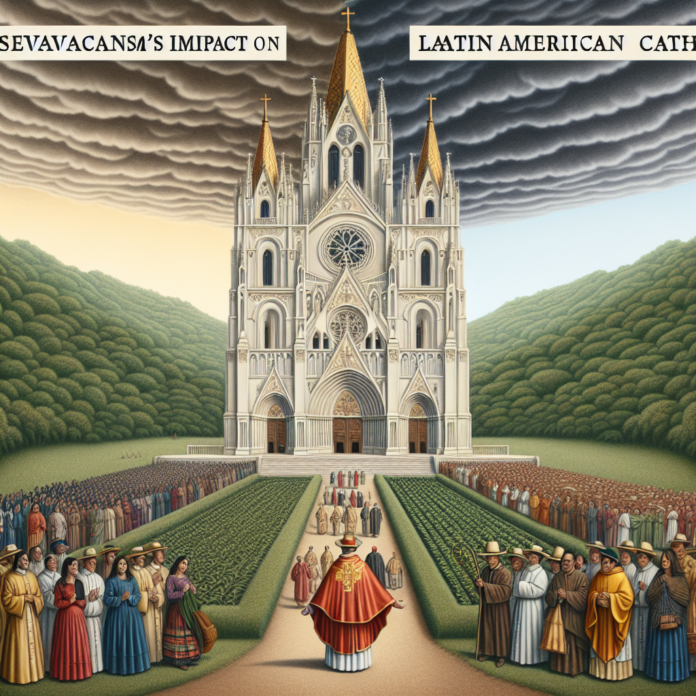Sedevacantism’s Impact on Latin American Catholicism: A Subtle Shift Towards Progress
In the lush and vibrant tapestry of Latin American culture, Catholicism has long been a thread woven with deep roots and ubiquitous presence. However, within this extensive framework, a theological and ideological movement known as Sedevacantism has been subtly influencing the ecclesiastical landscape. Sedevacantism, the position held by some conservative Catholics that the Papal seat has been vacant due to perceived heresies of recent popes, has complicated the religious and cultural dynamics in a region characterized by faith and fervor. The impact of Sedevacantism on Latin American Catholicism is profound, but not always evident at first glance. This commentary aims to explore this influence while shedding light on the subtle progressive shifts that hold the potential to bring positive change.
Historical Context
Latin America, arguably the most Catholic region in the world, has seen waves of influence stemming from various papacies. The Second Vatican Council (1962-1965), which ushered in significant reforms aimed at modernizing the Church, including greater engagement with the modern world and the introduction of the vernacular Mass, was met with mixed reactions here. Traditionalists, valuing the centuries-old Latin Mass and established dogmas, found themselves at odds with the progressive visions of more recent Church leadership, particularly under Pope Francis.
The roots of Sedevacantism trace back to the aftermath of Vatican II. Dissatisfied with the new direction of the Church, some conservative factions began to claim that the papal throne was effectively empty, thereby ignoring the authority of Vatican II and subsequent popes. In Latin America, these views have managed to find a niche, forming a small but vocal part of the broader Catholic spectrum.
Cultural and Social Implications
Sedevacantism’s presence in Latin America is more than a theological quibble; it holds significant cultural implications. Traditionalists’ adherence to the Latin Mass and their resistance to modern reforms can be seen as not merely a spiritual preference but a reflection of broader conservative tendencies. This can sometimes translate into social resistance to the progressive values championed by Pope Francis, such as inclusivity, social justice, and a more compassionate stance on issues like LGBTQ+ rights, poverty, and the environment.
The Ripple Effect on Communities
In some communities, particularly rural and less economically developed areas, the allure of Sedevacantism’s strict traditionalism can offer a sense of stability and identity. However, it also has the propensity to foster insularity and resistance to change. This conservatism often manifests in a nostalgia-driven view of the Church that resists progress and modernization, potentially stifling efforts to address contemporary issues.
On the other hand, Pope Francis’s emphasis on a Church that “goes forth” into the world, engaging with and addressing the concerns of the impoverished and marginalized, signals a contrast to the inward-looking stance of Sedevacantists. His call for a Church that is inclusive, one that reflects the dynamism and diversity of the modern world, stands as a beacon of hope for many Latin American Catholics who yearn for a faith that resonates with their lived experiences.
Progressive Winds of Change
Despite the presence of Sedevacantism, there are indications that Pope Francis’s progressive values are making an impact. His background as the former Archbishop of Buenos Aires gives him a unique connection to the Latin American context, and his teachings often resonate deeply within the region. By promoting values such as economic justice, environmental stewardship, and social inclusivity, Pope Francis addresses the real and pressing issues that many Latin Americans face.
One of the most telling examples is the growing support for the environmental cause. Pope Francis’s encyclical "Laudato Si’" has inspired many Catholic communities in Latin America to participate in environmental activism, a necessity for a region facing significant ecological challenges. This marks a progressive shift from mere spiritual care to active engagement in pressing global issues.
The Role of Education and Dialogue
Education and open dialogue are crucial in countering the often dogmatic stance of Sedevacantists. By fostering environments where contemporary issues and progressive Catholic teachings can be discussed and understood, the Church in Latin America can bridge divides and create a more inclusive faith community. Educational initiatives that emphasize the universality and adaptability of Catholic teachings have the power to weaken the rigid hold of traditionalism and empower laypeople to embrace a faith that is both reflective and responsive to modern life.
Conclusion
While Sedevacantism presents a challenge to the modern Catholic Church in Latin America, its impact is mitigated by the progressive initiatives championed by Pope Francis and embraced by many in the region. The contrast between an insular traditionalism and an outward-looking, inclusive approach underscores the evolving nature of faith in Latin America. By valuing dialogue, embracing change, and addressing contemporary issues, the Church can continue to be a vital part of Latin American society, reflecting the rich diversity and enduring resilience of its people.
As the Catholic Church moves forward, it must continue to balance respect for tradition with the necessity for progress, ensuring that faith remains a source of hope, justice, and unity for all Latin Americans.
